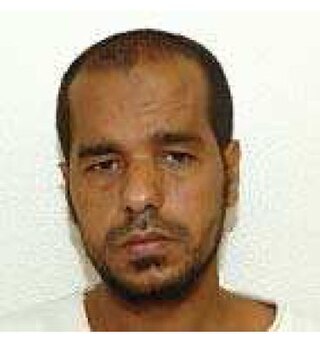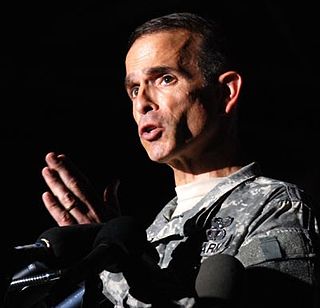
Omar Ahmed Said Khadr is a Canadian who, at the age of 15, was detained by the United States at Guantanamo Bay for ten years, during which he pleaded guilty to the murder of U.S. Army Sergeant 1st Class Christopher Speer and other charges. He later appealed his conviction, claiming that he falsely pleaded guilty so that he could return to Canada where he remained in custody for three additional years. Khadr sued the Canadian government for infringing his rights under the Charter of Rights and Freedoms; this lawsuit was settled in 2017 with a CA$10.5 million payment and an apology by the federal government.

Salim Ahmed Salim Hamdan is a Yemeni man, captured during the invasion of Afghanistan, declared by the United States government to be an illegal enemy combatant and held as a detainee at Guantanamo Bay from 2002 to November 2008. He admits to being Osama bin Laden's personal driver and said he needed the money.
Peter E. Brownback III is a retired military officer and lawyer. He was appointed in 2004 by general John D. Altenburg as a Presiding Officer on the Guantanamo military commissions. The Washington Post reported: "...that Brownback and Altenburg have known each other since 1977, that Brownback's wife worked for Altenburg, and that Altenburg hosted Brownback's retirement party in 1999."
Robert L. Swann is an American lawyer and retired career Army colonel. He was the second Chief Prosecutor of the Military Commission at Guantanamo Bay detention camp, serving 2004 to 2006. He followed Fred Borch, who resigned in disgrace, and William Lietzau, acting Chief Prosecutor.

Morris Durham "Moe" Davis is an American retired U.S. Air Force colonel, attorney, educator, politician, and former administrative law judge.

Abdul Zahir is a citizen of Afghanistan, who was held in extrajudicial detention in the United States' Guantanamo Bay detention camps, in Cuba. He was the tenth captive, and the first Afghan, to face charges before the first Presidentially authorized Guantanamo military commissions. After the US Supreme Court ruled that the President lacked the constitutional authority to set up military commissions, the United States Congress passed the Military Commissions Act of 2006. He was not charged under that system.

William "Bill" C. Kuebler was an American lawyer and a Commander in the United States Navy Judge Advocate General's Corps, assigned to the U.S. Navy Office of the Judge Advocate General, International and Operational Law Division. Kuebler was previously assigned to the Office of Military Commissions. Prior to the decision of the United States Supreme Court in Hamdan v. Rumsfeld, to overturn the then current version of the Guantanamo military commissions on constitutional grounds, Kuebler was detailed to defend Ghassan Abdullah al Sharbi. Al Sharbi had insisted on representing himself and Kuebler refused superior orders to act as his lawyer.
The Military Commissions Act of 2006 mandated that rulings from the Guantanamo military commissions could be appealed to a Court of Military Commission Review, which would sit in Washington D.C.

Thomas W. Hartmann is an American lawyer and officer in the United States Air Force Reserve. He has 32 years of criminal, commercial and civil litigation experience. Between 1983 and 1991 he was a prosecutor and defense counsel in the Air Force, including duties as Chief Air Force Prosecutor in Asia-Pacific Region. From 1991 to 1996 he was an associate at Bryan Cave LLP and at SBC Communications. In 1996 he became senior counsel for mergers & acquisitions for SBC Communications closing multiple deals worth several billion dollars in U.S., Europe, and South America as well as negotiating a strategic partnering agreement with a global internet service provider. From 1998 onwards he was general counsel for SBC Communications (1999–2001), Orius Corp. (2001–2004) and MxEnergy Inc. (2005–2007) in domestic and international settings. In July 2007 Brigadier General Hartmann was appointed the legal adviser to the convening authority in the Department of Defense Office of Military Commissions. In September 2008, as a result of the expansion of the commission efforts that Hartmann had led, Deputy Secretary of Defense Gordon England elevated Hartmann to become the director of operations, planning, and development for the commissions. Hartmann reported to Susan J. Crawford, a retired judge, who was the convening authority until March 2010.
Colby Vokey is an American lawyer and former officer in the United States Marine Corps. He currently practices criminal defense law in his own private practice. He represents clients in all types of criminal matters, with particular emphasis on cases involving military law. Vokey earned the rank of lieutenant colonel and served as a judge advocate in the United States Marine Corps during 21 years of service to his country. His retirement from the Marine Corps became effective November 1, 2008. During his military career, Vokey earned worldwide praise for his work ethic and integrity, based in part on his work for defendants detained at Guantanamo Bay, Cuba, who faced charges stemming from the war in Iraq.

Attorney Lawrence J. Morris is the chief of staff and counselor to the president at The Catholic University of America and a retired United States Army colonel.
Ralph Harold Kohlmann is an American lawyer and retired United States Marine Corps officer.
Joshua R. Claus is a former member of the United States Army, whose unit was present at both Iraq's Abu Ghraib and at the Bagram Theater Detention Facility in Afghanistan, and was the first interrogator of Guantanamo detainee Omar Khadr. In 2005, he was found guilty of maltreatment and assault against an Afghanistan detainee who later died.
Patrick Parrish is an officer in the United States Army.
Colonel Stephen R. Henley is an American lawyer and an officer in the United States Army.

David Frakt is an American lawyer, law professor, and officer in the United States Air Force Reserve.
Michael Chapman is an American lawyer, and former senior officer in the United States Army's Judge Advocate General corps, who was appointed the legal adviser to the Office of Military Commissions, in Guantanamo on September 19, 2008. According to the official press release that announced his appointment his previous appointments included being:

Brian L. Mizer is a United States Navy JAG officer. He is from the State of Nebraska. He attended Creighton University in Omaha, Nebraska, for his undergraduate degree and Case Western Reserve University for his Juris Doctor.
The Military Commissions Act of 2009, which amended the Military Commissions Act of 2006, was passed to address concerns by the United States Supreme Court. In Boumediene v. Bush (2008) the court had ruled that section 7 of the Military Commissions Act of 2006 was unconstitutional in suspending the right of detainees to habeas corpus. The court ruled that detainees had the right to access US federal courts to challenge their detentions.









